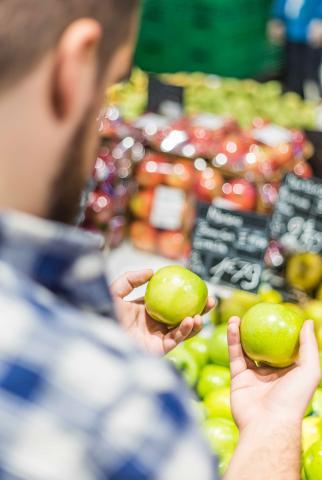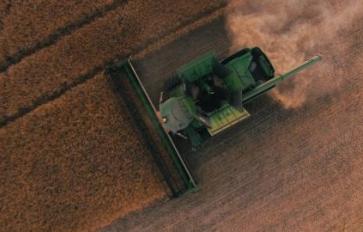
I'm sure many of you are familiar with those annoying stickers on fresh produce. Well guess what? They might not be around for much longer. Because more and more people are speaking out about how wasteful they are (those stickers can't be recycled, after all), they might just be replaced with tattoos. You heard me: Fruit tattoos. While these are not designed to be aesthetically pleasing, like tattoos humans get, they would be designed for functionality.
What exactly are fruit tattoos?
These unique labels would be produced by a technology that's already in use in some parts of the world. In essence, lasers etch the name of the grower (and potentially other identifiers like bar codes or organic labels) directly onto the surface of the fruit or vegetable. This technology was invented by a University of Florida scientist named Greg Douillard. The good part about all this is that there's no need for any actual ink (which wouldn't be safe for human consumption anyway). In reality, these tattoos would be closer related to etchings, because they use carbon dioxide to remove pigmentation on the outermost surface of the fruit. It's completely harmless and low impact.
The whole idea behind these tattoos is to cut back on the plastic packaging and produce stickers, both of which are wasteful and unrecyclable. And just to show that these fruit tattoos aren't merely a concept, fruits with tattooed skins are already on supermarket shelves in Spain, Sweden, and the UK.
Why should we have fruit tattoos?
When you go to a grocery store and see organic bananas for sale wrapped in plastic, doesn't it feel like that defeats the purpose? Organic produce is supposed to be better for the environment, and plastic packaging isn't part of that agenda. Even on conventional produce, plastic packaging is entirely unnecessary. If you doubt that, just go visit a farmers market: Their produce is plastic free (and sticker free) almost all the time. So it certainly can be done.
The difference between a farmers market and a grocery store is clear though: One shop sells mass produce, the other does not (farmers markets rely on local produce). And, of course, grocery stores don't just sell produce, they sell a slew of items. It makes sense why they need some sort of system to monitor their inventory. But with this development, it will be just as easy and more sustainable.
Not to mention big produce companies are spending "a quarter million dollars each year on sticky labels that end up in the trash," according to Douillard. However, his product (which retails for $184,000) lasts for 10 years and never requires additional supply costs. In other words, not only is it environmentally friendly, but it's also economically sound. It's no wonder food label companies are so against this in the USA. When you get down to it, money is always the reason.
Will we see fruit tattoos on supermarket shelves any time soon?
Other countries showing there's no risk to fruit tattoos will certainly help create a change. Unfortunately, fruit tattoos are currently only FDA approved on citrus here in the USA. Mind you, this came after years of legal battle.
Douillard said "anything [the label industry] could think of to accuse me of, they would. They said there was...bacteria getting into fruit, and all other kinds of malarkey."
That said, Douillard believes it should be easier to convince them this time around. According to Douillard, "we now have proof from these other countries coming in, showing how safe it is." So don't be too surprised if you start to see tattooed citrus in supermarkets before anything else!
Unfortunately, American consumers can have adverse reactions to innovative packaging. In other words, it may take a while for people to get used to such a development, despite its sustainability. Packaging like this needs to be gently introduced if it's going to win people over.
Currently, Douillard is working on getting FDA approval for tattooing avocados, melons, coconuts, kiwi, bananas, and pomegranates. For now, he's going to stick with produce that has disposable skin, even though his product would be harmless on other produce (like apples and peaches). Unfortunately, gaining those approvals takes time and can be rather costly, so he first needs to find an investor. He says it should not be a hard sell.
For this reason, we think those annoying stickers on produce may soon be a thing of the past, give or take a few years.
What do you think of fruit tattoos? Would you be opposed to seeing them on your fruit?








